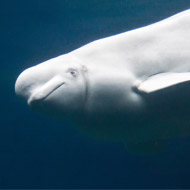
Public urged to stay away from the mammal to prevent distress
Conservationists have raised concern over a rare beluga whale spotted in the River Thames.
The whale, nicknamed Benny, was first seen on Tuesday (25 September) near Coalhouse Fort, Essex. Boat owners and members of the public were urged to stay away from the area to prevent the animal getting into distress.
Unconfirmed footage of the whale was posted to social media on Wednesday morning (26 September) and a team of rescue workers have been sent to the area to assess its condition.
Speaking to the Guardian, Samantha Lipman from British Divers Marine Life Rescue said she is concerned the whale could swim up the river towards central London.
“The further up you go, the busier the river is,” she said. “A sighting will attract more traffic so we are really urging people to watch from shore if it is around.”
She added that the charity would only consider trying to rescue the whale if got into distress.
“We can try to herd the animal out to sea with boats or helicopters but that is quite an extreme and risky measure and we don’t want to do more harm than good,” she said.
For the time being, the charity said it will continue to monitor the whale and will step in if its condition starts to deteriorate.
Beluga whales normally inhabit the Arctic Ocean and can be identified by their distinctive white markings.
According to the Whale and Dolphin Conservation Society, there have only been about 20 sighting of beluga whales off the coast of the UK. However, these have occurred off Scotland, Northern Ireland and Northumberland.



 The Veterinary Medicines Directorate (VMD) is inviting applications from veterinary students to attend a one-week extramural studies (EMS) placement in July 2026.
The Veterinary Medicines Directorate (VMD) is inviting applications from veterinary students to attend a one-week extramural studies (EMS) placement in July 2026.